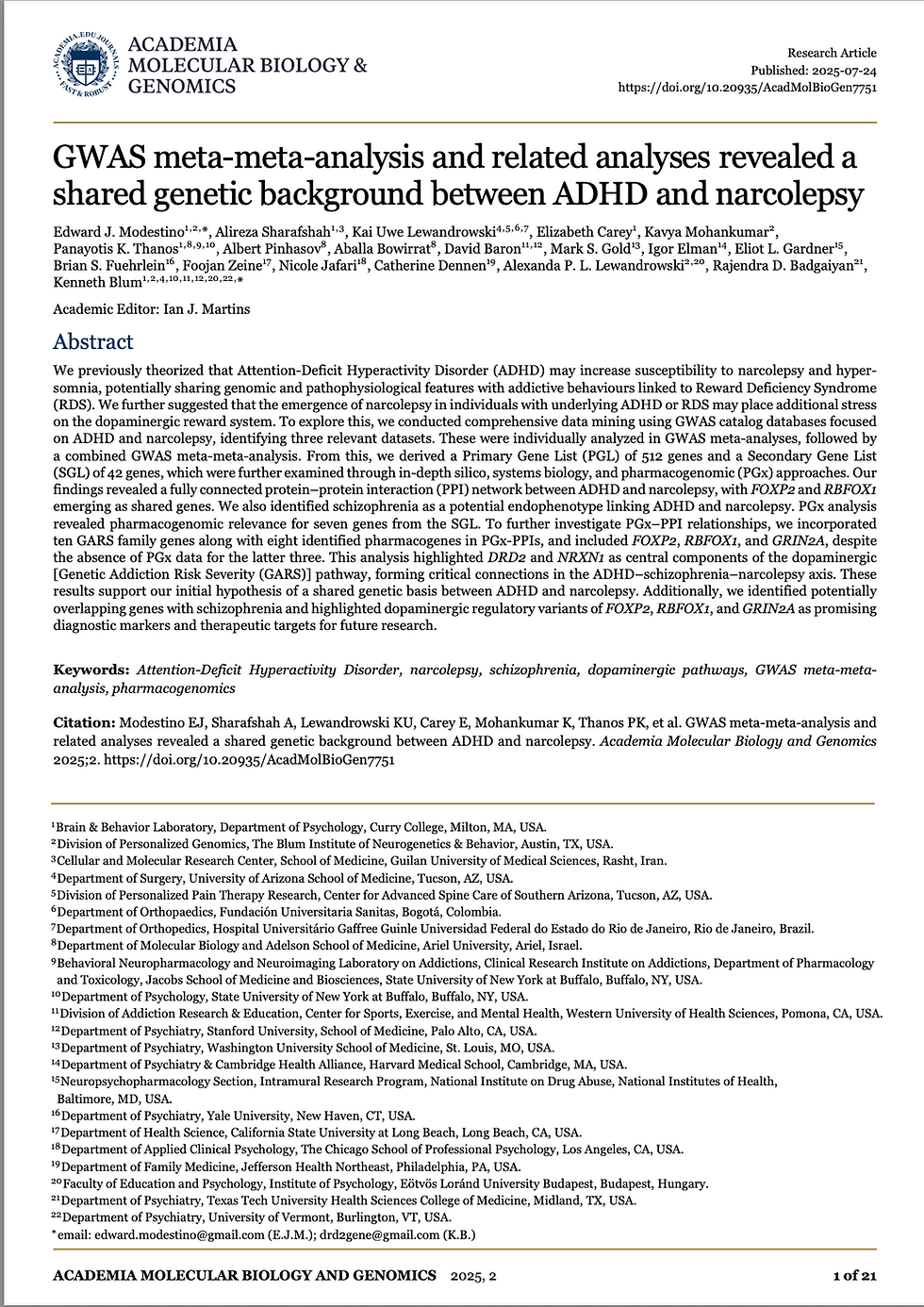March 2025 Director’s Blog: Environmental factors to combat the genetic risks of dementia: Developing a lifestyle plan
- Edward Justin Modestino, Ph.D.

- Mar 27, 2025
- 4 min read
Updated: Mar 28, 2025
Let's say you have genetic testing and discover something like this:

“gs141 3.5 Bad You carry one APOE-ε3 allele and one APOE-ε4 allele. This results in a 2x-3x increased relative risk of Alzheimer's disease. For non-Caucasians, the risk is increased, but SNPedia has not yet seen any reliable estimates. This is based on rs429358(C;T) rs7412(C;C)”
This means that you have an increased risk of developing Alzheimer’s disease in your late adult life. So, you have some genes. What can you do to decrease your environmental risk factors to assist with this, or what environmental things can you do?
In a previous blog, I mentioned that the antidepressant drug trazodone was helpful in promoting slow-wave sleep (SWS), the deep restorative sleep/stages 3 and 4, which can prevent or even reverse cognitive decline (La et al., 2019). Certainly, we know that SWS is where the glymphatic system cleans out toxins, including amyloid-beta (previously known as beta-amyloid), which is associated with Alzheimer’s disease (Reddy & van der Werf, 2020).
Another thing you might try is the Beacon40. The company claims that this device, which has a flickering light at 40 Hz, induces gamma brainwaves, I presume, by steady-state visual evoked potentials. The company cites various research studies related to this concept, including a study that claims, "...the 40Hz flicker led to significant increases in the expression of cytokines, key immune signals known to recruit the brain's immune cells that clear cell debris and toxic waste, including amyloid plaques."
There is evidence that elevated cortisol (the stress hormone) levels might increase the risk of dementia, including Alzheimer's disease (Ouanes & Popp, 2019). How can we decrease our stress and thus our cortisol? Certainly, we know that melatonin is in a circadian opposing balance with cortisol and that taking melatonin at bedtime can decrease cortisol (Pachimsawat et al., 2024). Perhaps taking procaine can decrease cortisol as well (Xu et al., 2003). Meditation has been shown to decrease cortisol (Turakitwanakan, Mekseepralard, & Busarakumtragul, 2013). Additionally, certain types of regular exercise can lessen cortisol (Athanasiou et al., 2022).
There are many things, environmental risks, you might want to avoid, such as soy, calcium supplements (without magnesium), benzodiazepines, and other anticholinergic medications. Soy/soybean products [which include tofu (tofu burgers, hotdogs, etc.), and soy is an additive in many foods and sauces (soy sauce, teriyaki, hoisin, etc.)] may be an environmental risk factor for dementia (White et al., 2000; Hogervorst et al., 2008). Dietary supplementation with calcium may be an environmental risk factor for brain damage (lesions)(Payne et al., 2013) and dementia (Kern et al., 2016). Benzodiazepines: tranquilizers used to treat generalized anxiety disorder, panic disorder, alcohol withdrawal, seizures, and to induce sedation or sleep, may be an environmental risk factor for dementia (Zhong et al., 2015). Various medications that are anticholinergic, some prescription and some over the counter, may be environmental risk factors for dementia (Wein, 2016). These drugs include antihistamines for allergies or motion sickness (which are often used off-label for sleep), antidepressants, stomach acid reducers, muscle relaxants, overactive bladder medications, antipsychotics, antihypertensives, etc.
For more information about this, please consider taking Dr. Modestino’s course, Psy 3600: Issues in Aging at Curry College. Some say Dr. Modestino is a wicked awesome neuroscientist!
References
Athanasiou, N., Bogdanis, G. C., & Mastorakos, G. (2022). Endocrine responses of the stress system to different types of exercise. Reviews in Endocrine and Metabolic Disorders, 24(2), 251–266. https://doi.org/10.1007/s11154-022-09758-1
Hogervorst, E., Sadjimim, T., Yesufu, A., Kreager, P., & Rahardjo, T. B. (2008). High tofu intake is associated with worse memory in elderly Indonesian men and women. Dementia and Geriatric Cognitive Disorders, 26(1), 50–57. https://doi.org/10.1159/000141484
Kern, J., Kern, S., Blennow, K., Zetterberg, H., Waern, M., Guo, X., Börjesson-Hanson, A., Skoog, I., & Östling, S. (2016). Calcium supplementation and risk of dementia in women with cerebrovascular disease. Neurology, 87(16), 1674–1680. https://doi.org/10.1212/wnl.0000000000003111
La, A. L., Walsh, C. M., Neylan, T. C., Vossel, K. A., Yaffe, K., Krystal, A. D., Miller, B. L., & Karageorgiou, E. (2019). Long-term trazodone use and cognition: A potential therapeutic role for slow-wave sleep enhancers. Journal of Alzheimer’s Disease, 67(3), 911–921. https://doi.org/10.3233/jad-181145
Ouanes, S., & Popp, J. (2019). High cortisol and the risk of dementia and alzheimer’s disease: A review of the literature. Frontiers in Aging Neuroscience, 11. https://doi.org/10.3389/fnagi.2019.00043
Pachimsawat, P., Ratanachamnong, P., & Jantaratnotai, N. (2024a). Exogenous melatonin’s effect on salivary cortisol and amylase: A randomized controlled trial. Pharmacology Research & Perspectives, 12(3). https://doi.org/10.1002/prp2.1205
Payne, M., Pierce, C., McQuoid, D., Steffens, D., & Anderson, J. (2013). Serum ionized calcium may be related to white matter lesion volumes in older adults: A pilot study. Nutrients, 5(6), 2192–2205. https://doi.org/10.3390/nu5062192
Reddy, O. C., & van der Werf, Y. D. (2020). The sleeping brain: Harnessing the power of the Glymphatic system through lifestyle choices. Brain Sciences, 10(11), 868. https://doi.org/10.3390/brainsci10110868
Turakitwanakan W, Mekseepralard C, Busarakumtragul P. (2024). Effects of mindfulness meditation on serum cortisol of medical students. J Med Assoc Thai. 96 (Suppl 1), S90-5.
Wein, A. J. (2016). Re: Association between anticholinergic medication use and cognition, brain metabolism, and brain atrophy in cognitively normal older adults. Journal of Urology, 196(5), 1500–1500. https://doi.org/10.1016/j.juro.2016.08.070
White, L. R., Petrovitch, H., Ross, G. W., Masaki, K., Hardman, J., Nelson, J., Davis, D., & Markesbery, W. (2000). Brain aging and midlife tofu consumption. Journal of the American College of Nutrition, 19(2), 242–255. https://doi.org/10.1080/07315724.2000.10718923
Xu, J., Lecanu, L., Han, Z., Yao, Z., Greeson, J., & Papadopoulos, V. (2003). Inhibition of adrenal cortical steroid formation by procaine is mediated by reduction of the camp-induced 3-hydroxy-3-methylglutaryl-coenzyme a reductase messenger ribonucleic acid levels. The Journal of Pharmacology and Experimental Therapeutics, 307(3), 1148–1157. https://doi.org/10.1124/jpet.103.055178
Zhong, G., Wang, Y., Zhang, Y., & Zhao, Y. (2015). Association between benzodiazepine use and dementia: A meta-analysis. PLOS ONE, 10(5). https://doi.org/10.1371/journal.pone.0127836




Comments